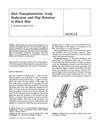 8 citations,
October 2017 in “Dermatologic surgery”
8 citations,
October 2017 in “Dermatologic surgery” Maintain a natural, masculine look while rejuvenating the eye area with careful, tailored techniques.
 8 citations,
February 2016 in “The American Journal of Dermatopathology”
8 citations,
February 2016 in “The American Journal of Dermatopathology” Hair transplants can make hair follicles larger and hair shafts thicker.
 8 citations,
March 2014 in “Dermatologic Clinics”
8 citations,
March 2014 in “Dermatologic Clinics” Specialized techniques are needed for hair restoration in individuals with curly Afrocentric hair due to unique challenges.
 8 citations,
July 2010 in “Aesthetic Plastic Surgery”
8 citations,
July 2010 in “Aesthetic Plastic Surgery” Adding more glutathione to the preservation solution doesn't reduce oxidative stress in hair transplants.
 8 citations,
March 2009 in “Aesthetic Plastic Surgery”
8 citations,
March 2009 in “Aesthetic Plastic Surgery” The "flying-wings" scalp flap technique is a simple, safe, and effective way to reconstruct large areas of scalp loss in children.
 8 citations,
January 2009 in “Journal of pediatric endocrinology & metabolism/Journal of pediatric endocrinology and metabolism”
8 citations,
January 2009 in “Journal of pediatric endocrinology & metabolism/Journal of pediatric endocrinology and metabolism” A specific thyroid hormone resistance mutation may be linked to different types of hair loss.
 8 citations,
July 2008 in “Facial Plastic Surgery Clinics of North America”
8 citations,
July 2008 in “Facial Plastic Surgery Clinics of North America” More men are getting non-surgical cosmetic treatments due to increased income and social acceptance, with less invasive options being preferred.
 8 citations,
January 2008 in “Journal of Cosmetic and Laser Therapy”
8 citations,
January 2008 in “Journal of Cosmetic and Laser Therapy” Hair transplantation for men has improved, offering natural, lasting results, and may be enhanced by certain medications and future technologies.
 8 citations,
October 2005 in “Otolaryngologic Clinics of North America”
8 citations,
October 2005 in “Otolaryngologic Clinics of North America” The document concludes that successful management of eyebrow and forehead ptosis requires a thorough approach, considering anatomy, patient evaluation, and careful selection of surgical techniques.
 8 citations,
September 2004 in “Contact dermatitis”
8 citations,
September 2004 in “Contact dermatitis” Avoiding dyed wigs and clothing improved severe allergic reactions in a woman treated with diphencyprone.
 8 citations,
January 1998 in “Journal of Cutaneous Medicine and Surgery”
8 citations,
January 1998 in “Journal of Cutaneous Medicine and Surgery” Hair transplantation is effective for baldness, with new methods improving results, but staying updated is crucial for patient outcomes.
 8 citations,
January 1986 in “The Journal of Dermatologic Surgery and Oncology”
8 citations,
January 1986 in “The Journal of Dermatologic Surgery and Oncology” Hair loss surgeries like grafts, scalp reductions, and flap rotations can be effective for black men with proper technique adjustments.
 7 citations,
October 2019 in “Case reports in endocrinology”
7 citations,
October 2019 in “Case reports in endocrinology” A young woman's symptoms suggested PCOS, but tests and surgery confirmed and treated a rare ovarian tumor, resolving her condition.
 7 citations,
July 2019 in “Clinics in Dermatology”
7 citations,
July 2019 in “Clinics in Dermatology” Hair loss can indicate or worsen with systemic diseases, and treating the underlying condition is important.
 7 citations,
October 2018 in “Journal of Craniofacial Surgery”
7 citations,
October 2018 in “Journal of Craniofacial Surgery” About 21.3% of young, healthy Chinese men experience hair loss. Hairlines are mostly linear or have a central protrusion. Hair is densest on the top and back of the head, and hair follicles usually have 1 or 2 hairs. This information can help in designing hair restoration procedures.
 7 citations,
September 2018 in “Aesthetic surgery journal”
7 citations,
September 2018 in “Aesthetic surgery journal” Deoxycholic acid effectively reduces double chin fat with temporary side effects and high patient satisfaction.
 7 citations,
September 2017 in “Journal der Deutschen Dermatologischen Gesellschaft”
7 citations,
September 2017 in “Journal der Deutschen Dermatologischen Gesellschaft” Occipital donor sites for skin grafts heal faster, hurt less, look better, and have fewer complications than femoral sites.
 7 citations,
March 2017 in “Annals of Plastic Surgery”
7 citations,
March 2017 in “Annals of Plastic Surgery” The new Mercedes flap variant effectively closed medium-sized scalp defects in a single operation with good cosmetic results and no complications.
 7 citations,
September 2015 in “Archives of Plastic Surgery”
7 citations,
September 2015 in “Archives of Plastic Surgery” The lateral brow lift technique is safe, effective, and provides long-lasting results.
 7 citations,
March 2014 in “ISRN Biomaterials”
7 citations,
March 2014 in “ISRN Biomaterials” Keratin hydrogel from human hair helps rats recover better from spinal cord injuries.
 7 citations,
January 2014 in “Case reports in endocrinology”
7 citations,
January 2014 in “Case reports in endocrinology” A woman's excessive hair growth was caused by a rare benign tumor in her adrenal gland, which was successfully removed.
 7 citations,
August 2013 in “Facial Plastic Surgery Clinics of North America”
7 citations,
August 2013 in “Facial Plastic Surgery Clinics of North America” Megasessions in hair transplant can cover more area or increase density but need a skilled team and careful planning, and have both benefits like less downtime and risks like lower graft survival.
 7 citations,
July 2011 in “Survey of Ophthalmology”
7 citations,
July 2011 in “Survey of Ophthalmology” The document concludes that periocular hair disorders have various causes and treatments, and proper evaluation by specialists is important for management and prognosis.
 7 citations,
September 2008 in “Dermatologic surgery”
7 citations,
September 2008 in “Dermatologic surgery” Hair transplantation can successfully treat stubborn alopecia areata.
 7 citations,
August 2008 in “Cases Journal”
7 citations,
August 2008 in “Cases Journal” A hair tightly wrapped around a toddler's toe caused severe crying and was treated by surgery.
 7 citations,
March 2002 in “Aesthetic Surgery Journal”
7 citations,
March 2002 in “Aesthetic Surgery Journal” In 2002, hair restoration improved by using a different area for grafts and absorbable sutures, leading to less discomfort and better results.
 7 citations,
November 2000 in “Clinics in Dermatology”
7 citations,
November 2000 in “Clinics in Dermatology” Most hair loss in children is caused by a few common conditions and is easy to diagnose, but rare types require careful evaluation.
 7 citations,
June 1992 in “The Journal of Dermatologic Surgery and Oncology”
7 citations,
June 1992 in “The Journal of Dermatologic Surgery and Oncology” Hair transplantation is a viable treatment for some types of female hair loss, with careful donor assessment and attention to psychological factors.
 6 citations,
May 2020 in “Pharmacology Research & Perspectives”
6 citations,
May 2020 in “Pharmacology Research & Perspectives” A new gel form of minoxidil is equally effective for hair growth and safer for the heart and other organs than the traditional solution.
 6 citations,
April 2018 in “Facial Plastic Surgery”
6 citations,
April 2018 in “Facial Plastic Surgery” Treating the temple area carefully with combined methods improves facial youthfulness.






























